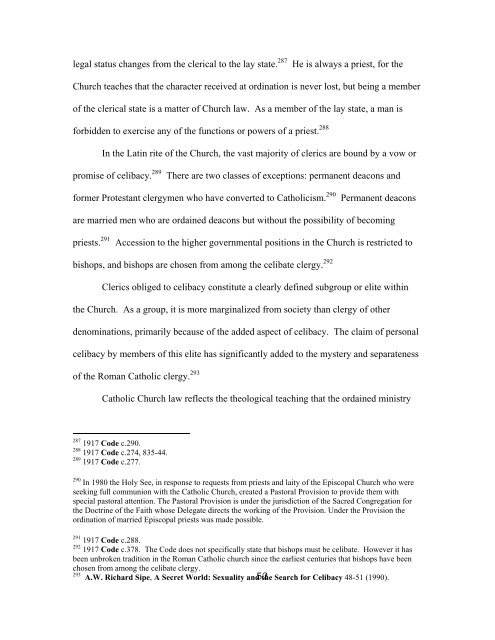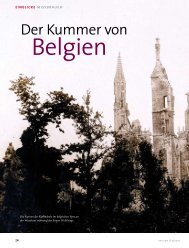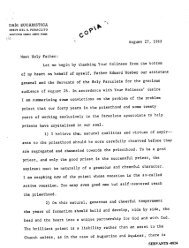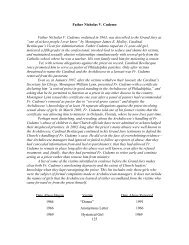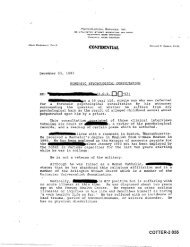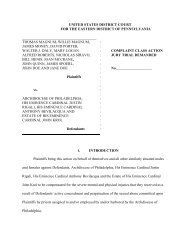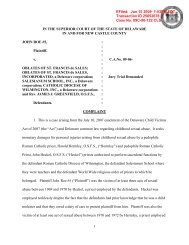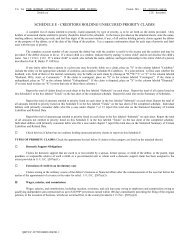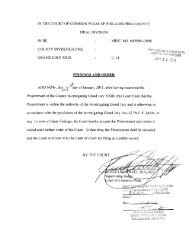1 1 Catholic Clergy Sexual Abuse Meets the Civil Law by Thomas P ...
1 1 Catholic Clergy Sexual Abuse Meets the Civil Law by Thomas P ...
1 1 Catholic Clergy Sexual Abuse Meets the Civil Law by Thomas P ...
You also want an ePaper? Increase the reach of your titles
YUMPU automatically turns print PDFs into web optimized ePapers that Google loves.
legal status changes from <strong>the</strong> clerical to <strong>the</strong> lay state. 287 He is always a priest, for <strong>the</strong><br />
Church teaches that <strong>the</strong> character received at ordination is never lost, but being a member<br />
of <strong>the</strong> clerical state is a matter of Church law. As a member of <strong>the</strong> lay state, a man is<br />
forbidden to exercise any of <strong>the</strong> functions or powers of a priest. 288<br />
In <strong>the</strong> Latin rite of <strong>the</strong> Church, <strong>the</strong> vast majority of clerics are bound <strong>by</strong> a vow or<br />
promise of celibacy. 289 There are two classes of exceptions: permanent deacons and<br />
former Protestant clergymen who have converted to <strong>Catholic</strong>ism. 290 Permanent deacons<br />
are married men who are ordained deacons but without <strong>the</strong> possibility of becoming<br />
priests. 291 Accession to <strong>the</strong> higher governmental positions in <strong>the</strong> Church is restricted to<br />
bishops, and bishops are chosen from among <strong>the</strong> celibate clergy. 292<br />
Clerics obliged to celibacy constitute a clearly defined subgroup or elite within<br />
<strong>the</strong> Church. As a group, it is more marginalized from society than clergy of o<strong>the</strong>r<br />
denominations, primarily because of <strong>the</strong> added aspect of celibacy. The claim of personal<br />
celibacy <strong>by</strong> members of this elite has significantly added to <strong>the</strong> mystery and separateness<br />
of <strong>the</strong> Roman <strong>Catholic</strong> clergy. 293<br />
<strong>Catholic</strong> Church law reflects <strong>the</strong> <strong>the</strong>ological teaching that <strong>the</strong> ordained ministry<br />
287 1917 Code c.290.<br />
288 1917 Code c.274, 835-44.<br />
289 1917 Code c.277.<br />
290 In 1980 <strong>the</strong> Holy See, in response to requests from priests and laity of <strong>the</strong> Episcopal Church who were<br />
seeking full communion with <strong>the</strong> <strong>Catholic</strong> Church, created a Pastoral Provision to provide <strong>the</strong>m with<br />
special pastoral attention. The Pastoral Provision is under <strong>the</strong> jurisdiction of <strong>the</strong> Sacred Congregation for<br />
<strong>the</strong> Doctrine of <strong>the</strong> Faith whose Delegate directs <strong>the</strong> working of <strong>the</strong> Provision. Under <strong>the</strong> Provision <strong>the</strong><br />
ordination of married Episcopal priests was made possible.<br />
291<br />
1917 Code c.288.<br />
292<br />
1917 Code c.378. The Code does not specifically state that bishops must be celibate. However it has<br />
been unbroken tradition in <strong>the</strong> Roman <strong>Catholic</strong> church since <strong>the</strong> earliest centuries that bishops have been<br />
chosen from among <strong>the</strong> celibate clergy.<br />
293<br />
A.W. Richard Sipe, A Secret World: <strong>Sexual</strong>ity and 52 <strong>the</strong> Search for Celibacy 48-51 (1990).


